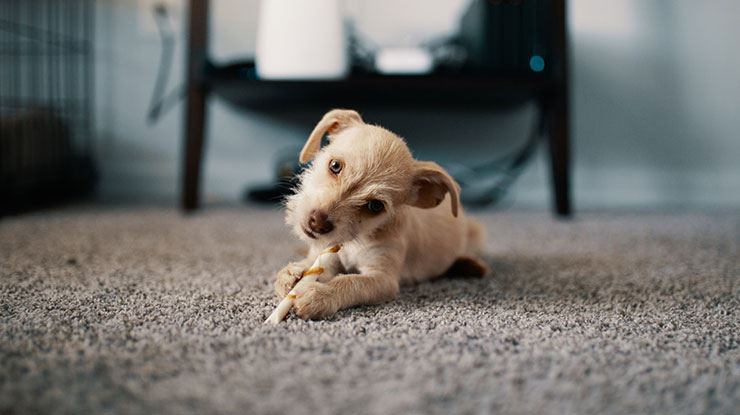
Household Safety Tips for Pet Owners
Whether you’re new to pet ownership or you’re a seasoned pro, and whether your dog is a puppy or full grown, it’s still important to be aware of some safety concerns in your home. It’s a lot like baby-proofing your home in that you need to foresee potential concerns and work to prevent any problems that could arise. Dogs don’t often know what is dangerous for them until it’s too late, so it’s their owner’s job to keep them safe. Some great tips include locking up your medications, getting rid of dangerous plants, storing your household chemicals appropriately, eliminating any fall risks, and being aware of chewing concerns that could get your pup into trouble.
Lock up Your Medications
Both animal and people medications should be kept up in a safe place where your pup can't reach them. Animal medication is often flavored in order to encourage the animal to take their medicine. Unfortunately, this also makes them quite tempting, and dogs can smell them even with the bottle closed. Ingesting these medications in high doses can lead to serious medical complications, so it’s important to keep them away from your pets. The same goes for human medications, and even holistic treatments like essential oils. Though there are ways to use essential oils in ways that are safe for pets, too much can cause problems and some are poisonous to pets, so use just as much caution with these as you do with your medications.
Research Your Plants
Whether you have house plants or outdoor plants, it’s best to do your research about the plants that your dog has access to in order to make sure that they are safe for them. Some plants that can be poisonous for your dog include rhubarb, daffodils, Easter lilies, and sago palms. In fact, plants are one of the more common household items that pose a threat to your furry family members. Do your research and get rid of any plants that are unsafe for your pup. If your dog ever ingests a plant and exhibits any problematic symptoms, get them to a vet right away.
Store Any Chemicals
There are many chemicals that are deadly for your dog. These include pesticides, antifreeze, and cleaning solutions. Ensure that any type of chemical in your home is stored in a place that your dog can’t reach or break into. Antifreeze can have a sweet taste that can lure in unsuspecting animals, and the same goes for some pesticides, so take the necessary precautions to keep them inaccessible. Children are harmed each year by ingesting laundry cleaning pods, and those chemicals can be dangerous for your pets as well. Keep your cleaning chemicals stored safely away from your kids as well as your pets. 
Eliminate Fall Risks
High places like windows, stairs, decks, and balconies can be dangerous for a pet. This is especially true for a pet who is unfamiliar with your home, is too young to understand the dangers of certain scenarios, has a disability, or is chasing something. Older dogs who are not as agile as they once were may have added issues with falling as well. In order to prevent injuries from falling, you can use animal gates to block off certain areas. Make sure you have screens installed in your windows to help prevent an accidental fall from a window. Always be sure your pet is supervised around risky areas, and train your dog on how to maneuver stairs if they are uncertain about them.
Be Aware of Chewing Concerns
Young dogs especially love chewing on things, but it’s an issue that can plague older dogs as well. For this reason, it’s important to make sure your dog isn’t trying to chew on or eat things that are unsafe for them. These may include Christmas lights, electrical cords, unsafe animal bones, plastic, and many different kinds of people food. Chewing on an electrical item can cause an electric shock, so it’s vital to keep those items away from your dog. Many plastics can cause a blockage that can be extremely dangerous, and some food items can be deadly as well. Make sure to pet-proof your home and offer them plenty of safe chew toys.
Many of these household safety tips involve being aware of the things in your home that can hurt your dog, and working to keep them as far away from your pup as possible. Dogs are naturally inquisitive, so it’s common for them to find themselves getting into things they aren’t supposed to. As their owner, it’s up to you to supervise them and keep them safe from their need to explore and experiment with what they can and can't eat. By locking up your medications, getting rid of toxic plants, storing your chemicals, eliminating fall risks, and being aware of chewing dangers, you can keep your furry family member safe in their home.










